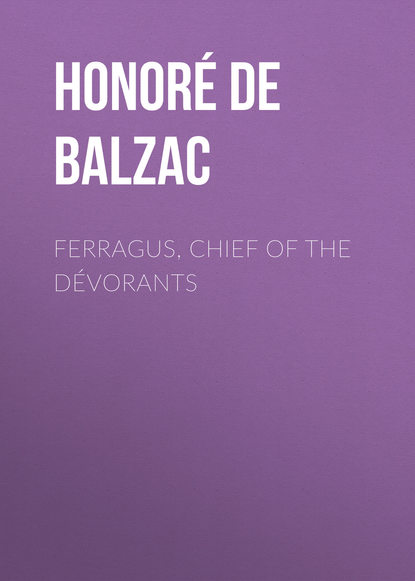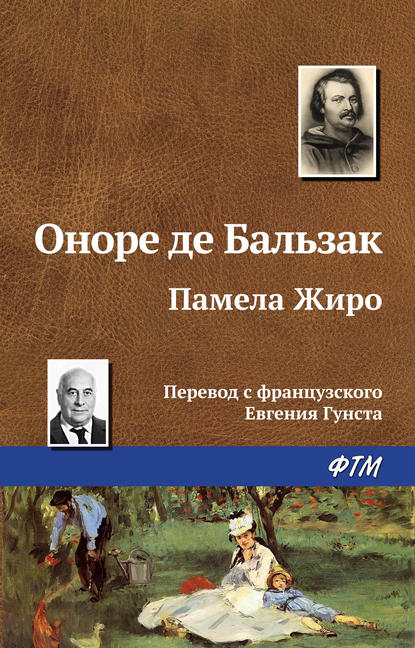
Полная версия
Ferragus, Chief of the Dévorants
“Impatient for what?” said the young man to himself, drawing back to lean against a wooden railing on the other side of the street. He gazed, unhappy man, at the different storeys of the house, with the keen attention of a detective searching for a conspirator.
It was one of those houses of which there are thousands in Paris, ignoble, vulgar, narrow, yellowish in tone, with four storeys and three windows on each floor. The outer blinds of the first floor were closed. Where was she going? The young man fancied he heard the tinkle of a bell on the second floor. As if in answer to it, a light began to move in a room with two windows strongly illuminated, which presently lit up the third window, evidently that of a first room, either the salon or the dining-room of the apartment. Instantly the outline of a woman’s bonnet showed vaguely on the window, and a door between the two rooms must have closed, for the first was dark again, while the two other windows resumed their ruddy glow. At this moment a voice said, “Hi, there!” and the young man was conscious of a blow on his shoulder.
“Why don’t you pay attention?” said the rough voice of a workman, carrying a plank on his shoulder. The man passed on. He was the voice of Providence saying to the watcher: “What are you meddling with? Think of your own duty; and leave these Parisians to their own affairs.”
The young man crossed his arms; then, as no one beheld him, he suffered tears of rage to flow down his cheeks unchecked. At last the sight of the shadows moving behind the lighted windows gave him such pain that he looked elsewhere and noticed a hackney-coach, standing against a wall in the upper part of the rue des Vieux-Augustins, at a place where there was neither the door of a house, nor the light of a shop-window.
Was it she? Was it not she? Life or death to a lover! This lover waited. He stood there during a century of twenty minutes. After that the woman came down, and he then recognized her as the one whom he secretly loved. Nevertheless, he wanted still to doubt. She went to the hackney-coach, and got into it.
“The house will always be there and I can search it later,” thought the young man, following the carriage at a run, to solve his last doubts; and soon he did so.
The carriage stopped in the rue de Richelieu before a shop for artificial flowers, close to the rue de Menars. The lady got out, entered the shop, sent out the money to pay the coachman, and presently left the shop herself, on foot, after buying a bunch of marabouts. Marabouts for her black hair! The officer beheld her, through the window-panes, placing the feathers to her head to see the effect, and he fancied he could hear the conversation between herself and the shop-woman.
“Oh! madame, nothing is more suitable for brunettes: brunettes have something a little too strongly marked in their lines, and marabouts give them just that flow which they lack. Madame la Duchesse de Langeais says they give a woman something vague, Ossianic, and very high-bred.”
“Very good; send them to me at once.”
Then the lady turned quickly toward the rue de Menars, and entered her own house. When the door closed on her, the young lover, having lost his hopes, and worse, far worse, his dearest beliefs, walked through the streets like a drunken man, and presently found himself in his own room without knowing how he came there. He flung himself into an arm-chair, put his head in his hands and his feet on the andirons, drying his boots until he burned them. It was an awful moment, – one of those moments in human life when the character is moulded, and the future conduct of the best of men depends on the good or evil fortune of his first action. Providence or fatality? – choose which you will.
This young man belonged to a good family, whose nobility was not very ancient; but there are so few really old families in these days, that all men of rank are ancient without dispute. His grandfather had bought the office of counsellor to the Parliament of Paris, where he afterwards became president. His sons, each provided with a handsome fortune, entered the army, and through their marriages became attached to the court. The Revolution swept the family away; but one old dowager, too obstinate to emigrate, was left; she was put in prison, threatened with death, but was saved by the 9th Thermidor and recovered her property. When the proper time came, about the year 1804, she recalled her grandson to France. Auguste de Maulincour, the only scion of the Carbonnon de Maulincour, was brought up by the good dowager with the triple care of a mother, a woman of rank, and an obstinate dowager. When the Restoration came, the young man, then eighteen years of age, entered the Maison-Rouge, followed the princes to Ghent, was made an officer in the body-guard, left it to serve in the line, but was recalled later to the Royal Guard, where, at twenty-three years of age, he found himself major of a cavalry regiment, – a splendid position, due to his grandmother, who had played her cards well to obtain it, in spite of his youth. This double biography is a compendium of the general and special history, barring variations, of all the noble families who emigrated having debts and property, dowagers and tact.
Madame la Baronne de Maulincour had a friend in the old Vidame de Pamiers, formerly a commander of the Knights of Malta. This was one of those undying friendships founded on sexagenary ties which nothing can weaken, because at the bottom of such intimacies there are certain secrets of the human heart, delightful to guess at when we have the time, insipid to explain in twenty words, and which might make the text of a work in four volumes as amusing as the Doyen de Killerine, – a work about which young men talk and judge without having read it.
Auguste de Maulincour belonged therefore to the faubourg Saint-Germain through his grandmother and the vidame, and it sufficed him to date back two centuries to take the tone and opinions of those who assume to go back to Clovis. This young man, pale, slender, and delicate in appearance, a man of honor and true courage, who would fight a duel for a yes or a no, had never yet fought upon a battle-field, though he wore in his button-hole the cross of the Legion of honor. He was, as you perceive, one of the blunders of the Restoration, perhaps the most excusable of them. The youth of those days was the youth of no epoch. It came between the memories of the Empire and those of the Emigration, between the old traditions of the court and the conscientious education of the bourgeoisie; between religion and fancy-balls; between two political faiths, between Louis XVIII., who saw only the present, and Charles X., who looked too far into the future; it was moreover bound to accept the will of the king, though the king was deceiving and tricking it. This unfortunate youth, blind and yet clear-sighted, was counted as nothing by old men jealously keeping the reins of the State in their feeble hands, while the monarchy could have been saved by their retirement and the accession of this Young France, which the old doctrinaires, the emigres of the Restoration, still speak of slightingly. Auguste de Maulincour was a victim to the ideas which weighed in those days upon French youth, and we must here explain why.
The Vidame de Pamiers was still, at sixty-seven years of age, a very brilliant man, having seen much and lived much; a good talker, a man of honor and a gallant man, but who held as to women the most detestable opinions; he loved them, and he despised them. Their honor! their feelings! Ta-ra-ra, rubbish and shams! When he was with them, he believed in them, the ci-devant “monstre”; he never contradicted them, and he made them shine. But among his male friends, when the topic of the sex came up, he laid down the principle that to deceive women, and to carry on several intrigues at once, should be the occupation of those young men who were so misguided as to wish to meddle in the affairs of the State. It is sad to have to sketch so hackneyed a portrait, for has it not figured everywhere and become, literally, as threadbare as that of a grenadier of the Empire? But the vidame had an influence on Monsieur de Maulincour’s destiny which obliges us to preserve his portrait; he lectured the young man after his fashion, and did his best to convert him to the doctrines of the great age of gallantry.
The dowager, a tender-hearted, pious woman, sitting between God and her vidame, a model of grace and sweetness, but gifted with that well-bred persistency which triumphs in the long run, had longed to preserve for her grandson the beautiful illusions of life, and had therefore brought him up in the highest principles; she instilled into him her own delicacy of feeling and made him, to outward appearance, a timid man, if not a fool. The sensibilities of the young fellow, preserved pure, were not worn by contact without; he remained so chaste, so scrupulous, that he was keenly offended by actions and maxims to which the world attached no consequence. Ashamed of this susceptibility, he forced himself to conceal it under a false hardihood; but he suffered in secret, all the while scoffing with others at the things he reverenced.
It came to pass that he was deceived; because, in accordance with a not uncommon whim of destiny, he, a man of gentle melancholy, and spiritual in love, encountered in the object of his first passion a woman who held in horror all German sentimentalism. The young man, in consequence, distrusted himself, became dreamy, absorbed in his griefs, complaining of not being understood. Then, as we desire all the more violently the things we find difficult to obtain, he continued to adore women with that ingenuous tenderness and feline delicacy the secret of which belongs to women themselves, who may, perhaps, prefer to keep the monopoly of it. In point of fact, though women of the world complain of the way men love them, they have little liking themselves for those whose soul is half feminine. Their own superiority consists in making men believe they are their inferiors in love; therefore they will readily leave a lover if he is inexperienced enough to rob them of those fears with which they seek to deck themselves, those delightful tortures of feigned jealousy, those troubles of hope betrayed, those futile expectations, – in short, the whole procession of their feminine miseries. They hold Sir Charles Grandison in horror. What can be more contrary to their nature than a tranquil, perfect love? They want emotions; happiness without storms is not happiness to them. Women with souls that are strong enough to bring infinitude into love are angelic exceptions; they are among women what noble geniuses are among men. Their great passions are rare as masterpieces. Below the level of such love come compromises, conventions, passing and contemptible irritations, as in all things petty and perishable.
Amid the hidden disasters of his heart, and while he was still seeking the woman who could comprehend him (a search which, let us remark in passing, is one of the amorous follies of our epoch), Auguste met, in the rank of society that was farthest from his own, in the secondary sphere of money, where banking holds the first place, a perfect being, one of those women who have I know not what about them that is saintly and sacred, – women who inspire such reverence that love has need of the help of a long familiarity to declare itself.
Auguste then gave himself up wholly to the delights of the deepest and most moving of passions, to a love that was purely adoring. Innumerable repressed desires there were, shadows of passion so vague yet so profound, so fugitive and yet so actual, that one scarcely knows to what we may compare them. They are like perfumes, or clouds, or rays of the sun, or shadows, or whatever there is in nature that shines for a moment and disappears, that springs to life and dies, leaving in the heart long echoes of emotion. When the soul is young enough to nurture melancholy and far-off hope, to find in woman more than a woman, is it not the greatest happiness that can befall a man when he loves enough to feel more joy in touching a gloved hand, or a lock of hair, in listening to a word, in casting a single look, than in all the ardor of possession given by happy love? Thus it is that rejected persons, those rebuffed by fate, the ugly and unfortunate, lovers unrevealed, women and timid men, alone know the treasures contained in the voice of the beloved. Taking their source and their element from the soul itself, the vibrations of the air, charged with passion, put our hearts so powerfully into communion, carrying thought between them so lucidly, and being, above all, so incapable of falsehood, that a single inflection of a voice is often a revelation. What enchantments the intonations of a tender voice can bestow upon the heart of a poet! What ideas they awaken! What freshness they shed there! Love is in the voice before the glance avows it. Auguste, poet after the manner of lovers (there are poets who feel, and poets who express; the first are the happiest), Auguste had tasted all these early joys, so vast, so fecund. SHE possessed the most winning organ that the most artful woman of the world could have desired in order to deceive at her ease; she had that silvery voice which is soft to the ear, and ringing only for the heart which it stirs and troubles, caresses and subjugates.
And this woman went by night to the rue Soly through the rue Pagevin! and her furtive apparition in an infamous house had just destroyed the grandest of passions! The vidame’s logic triumphed.
“If she is betraying her husband we will avenge ourselves,” said Auguste.
There was still faith in that “if.” The philosophic doubt of Descartes is a politeness with which we should always honor virtue. Ten o’clock sounded. The Baron de Maulincour remembered that this woman was going to a ball that evening at a house to which he had access. He dressed, went there, and searched for her through all the salons. The mistress of the house, Madame de Nucingen, seeing him thus occupied, said: —
“You are looking for Madame Jules; but she has not yet come.”
“Good evening, dear,” said a voice.
Auguste and Madame de Nucingen turned round. Madame Jules had arrived, dressed in white, looking simple and noble, wearing in her hair the marabouts the young baron had seen her choose in the flower-shop. That voice of love now pierced his heart. Had he won the slightest right to be jealous of her he would have petrified her then and there by saying the words, “Rue Soly!” But if he, an alien to her life, had said those words in her ear a thousand times, Madame Jules would have asked him in astonishment what he meant. He looked at her stupidly.
For those sarcastic persons who scoff at all things it may be a great amusement to detect the secret of a woman, to know that her chastity is a lie, that her calm face hides some anxious thought, that under that pure brow is a dreadful drama. But there are other souls to whom the sight is saddening; and many of those who laugh in public, when withdrawn into themselves and alone with their conscience, curse the world while they despise the woman. Such was the case with Auguste de Maulincour, as he stood there in presence of Madame Jules. Singular situation! There was no other relation between them than that which social life establishes between persons who exchange a few words seven or eight times in the course of a winter, and yet he was calling her to account on behalf of a happiness unknown to her; he was judging her, without letting her know of his accusation.
Many young men find themselves thus in despair at having broken forever with a woman adored in secret, condemned and despised in secret. There are many hidden monologues told to the walls of some solitary lodging; storms roused and calmed without ever leaving the depths of hearts; amazing scenes of the moral world, for which a painter is wanted. Madame Jules sat down, leaving her husband to make a turn around the salon. After she was seated she seemed uneasy, and, while talking with her neighbor, she kept a furtive eye on Monsieur Jules Desmarets, her husband, a broker chiefly employed by the Baron de Nucingen. The following is the history of their home life.
Monsieur Desmarets was, five years before his marriage, in a broker’s office, with no other means than the meagre salary of a clerk. But he was a man to whom misfortune had early taught the truths of life, and he followed the strait path with the tenacity of an insect making for its nest; he was one of those dogged young men who feign death before an obstacle and wear out everybody’s patience with their own beetle-like perseverance. Thus, young as he was, he had all the republican virtue of poor peoples; he was sober, saving of his time, an enemy to pleasure. He waited. Nature had given him the immense advantage of an agreeable exterior. His calm, pure brow, the shape of his placid, but expressive face, his simple manners, – all revealed in him a laborious and resigned existence, that lofty personal dignity which is imposing to others, and the secret nobility of heart which can meet all events. His modesty inspired a sort of respect in those who knew him. Solitary in the midst of Paris, he knew the social world only by glimpses during the brief moments which he spent in his patron’s salon on holidays.
There were passions in this young man, as in most of the men who live in that way, of amazing profundity, – passions too vast to be drawn into petty incidents. His want of means compelled him to lead an ascetic life, and he conquered his fancies by hard work. After paling all day over figures, he found his recreation in striving obstinately to acquire that wide general knowledge so necessary in these days to every man who wants to make his mark, whether in society, or in commerce, at the bar, or in politics or literature. The only peril these fine souls have to fear comes from their own uprightness. They see some poor girl; they love her; they marry her, and wear out their lives in a struggle between poverty and love. The noblest ambition is quenched perforce by the household account-book. Jules Desmarets went headlong into this peril.
He met one evening at his patron’s house a girl of the rarest beauty. Unfortunate men who are deprived of affection, and who consume the finest hours of youth in work and study, alone know the rapid ravages that passion makes in their lonely, misconceived hearts. They are so certain of loving truly, all their forces are concentrated so quickly on the object of their love, that they receive, while beside her, the most delightful sensations, when, as often happens, they inspire none at all. Nothing is more flattering to a woman’s egotism than to divine this passion, apparently immovable, and these emotions so deep that they have needed a great length of time to reach the human surface. These poor men, anchorites in the midst of Paris, have all the enjoyments of anchorites; and may sometimes succumb to temptations. But, more often deceived, betrayed, and misunderstood, they are rarely able to gather the sweet fruits of a love which, to them, is like a flower dropped from heaven.
One smile from his wife, a single inflection of her voice sufficed to make Jules Desmarets conceive a passion which was boundless. Happily, the concentrated fire of that secret passion revealed itself artlessly to the woman who inspired it. These two beings then loved each other religiously. To express all in a word, they clasped hands without shame before the eyes of the world and went their way like two children, brother and sister, passing serenely through a crowd where all made way for them and admired them.
The young girl was in one of those unfortunate positions which human selfishness entails upon children. She had no civil status; her name of “Clemence” and her age were recorded only by a notary public. As for her fortune, that was small indeed. Jules Desmarets was a happy man on hearing these particulars. If Clemence had belonged to an opulent family, he might have despaired of obtaining her; but she was only the poor child of love, the fruit of some terrible adulterous passion; and they were married. Then began for Jules Desmarets a series of fortunate events. Every one envied his happiness; and henceforth talked only of his luck, without recalling either his virtues or his courage.
Some days after their marriage, the mother of Clemence, who passed in society for her godmother, told Jules Desmarets to buy the office and good-will of a broker, promising to provide him with the necessary capital. In those days, such offices could still be bought at a modest price. That evening, in the salon as it happened of his patron, a wealthy capitalist proposed, on the recommendation of the mother, a very advantageous transaction for Jules Desmarets, and the next day the happy clerk was able to buy out his patron. In four years Desmarets became one of the most prosperous men in his business; new clients increased the number his predecessor had left to him; he inspired confidence in all; and it was impossible for him not to feel, by the way business came to him, that some hidden influence, due to his mother-in-law, or to Providence, was secretly protecting him.
At the end of the third year Clemence lost her godmother. By that time Monsieur Jules (so called to distinguish him from an elder brother, whom he had set up as a notary in Paris) possessed an income from invested property of two hundred thousand francs. There was not in all Paris another instance of the domestic happiness enjoyed by this couple. For five years their exceptional love had been troubled by only one event, – a calumny for which Monsieur Jules exacted vengeance. One of his former comrades attributed to Madame Jules the fortune of her husband, explaining that it came from a high protection dearly paid for. The man who uttered the calumny was killed in the duel that followed it.
The profound passion of this couple, which survived marriage, obtained a great success in society, though some women were annoyed by it. The charming household was respected; everybody feted it. Monsieur and Madame Jules were sincerely liked, perhaps because there is nothing more delightful to see than happy people; but they never stayed long at any festivity. They slipped away early, as impatient to regain their nest as wandering pigeons. This nest was a large and beautiful mansion in the rue de Menars, where a true feeling for art tempered the luxury which the financial world continues, traditionally, to display. Here the happy pair received their society magnificently, although the obligations of social life suited them but little.
Nevertheless, Jules submitted to the demands of the world, knowing that, sooner or later, a family has need of it; but he and his wife felt themselves, in its midst, like green-house plants in a tempest. With a delicacy that was very natural, Jules had concealed from his wife the calumny and the death of the calumniator. Madame Jules, herself, was inclined, through her sensitive and artistic nature, to desire luxury. In spite of the terrible lesson of the duel, some imprudent women whispered to each other that Madame Jules must sometimes be pressed for money. They often found her more elegantly dressed in her own home than when she went into society. She loved to adorn herself to please her husband, wishing to show him that to her he was more than any social life. A true love, a pure love, above all, a happy love! Jules, always a lover, and more in love as time went by, was happy in all things beside his wife, even in her caprices; in fact, he would have been uneasy if she had none, thinking it a symptom of some illness.
Auguste de Maulincour had the personal misfortune of running against this passion, and falling in love with the wife beyond recovery. Nevertheless, though he carried in his heart so intense a love, he was not ridiculous; he complied with all the demands of society, and of military manners and customs. And yet his face wore constantly, even though he might be drinking a glass of champagne, that dreamy look, that air of silently despising life, that nebulous expression which belongs, though for other reasons, to blases men, – men dissatisfied with hollow lives. To love without hope, to be disgusted with life, constitute, in these days, a social position. The enterprise of winning the heart of a sovereign might give, perhaps, more hope than a love rashly conceived for a happy woman. Therefore Maulincour had sufficient reason to be grave and gloomy. A queen has the vanity of her power; the height of her elevation protects her. But a pious bourgeoise is like a hedgehog, or an oyster, in its rough wrappings.












